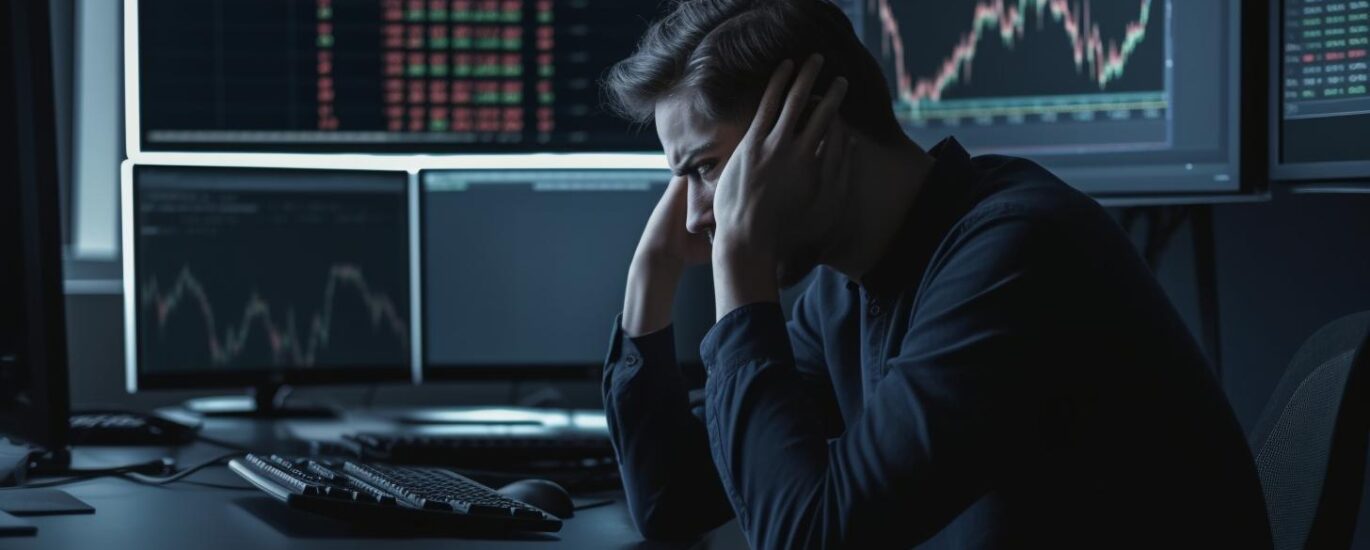Forex trading, often referred to as FX trading, is the act of buying and selling currencies on the foreign exchange market. It’s a global marketplace where every world currency gets traded. As of my last update in 2021, the daily volume in the Forex market surpassed $6 trillion, making it the largest and most liquid financial market in the world. This towering volume emphasizes the global importance of Forex trading, attracting participants ranging from massive financial institutions to individual retail traders.
However, despite the allure of Forex trading and its potential profitability, an alarmingly high percentage of Forex traders experience failure. Some estimates suggest that up to 70-90% of individual traders end up losing money. This raises a critical question: Why do so many traders fail in the Forex market? Understanding the reasons behind this can not only pave the way for success in the Forex arena but also provide valuable insights for those venturing into the evolving world of cryptocurrencies.
Indeed, there’s an undeniable intersection between Forex and the world of cryptocurrencies. Both markets have witnessed phenomenal growth, carry certain risks, and offer significant rewards. As such, lessons learned from the pitfalls and successes in Forex trading can be invaluable when applied to the volatile crypto market. By recognizing common challenges and leveraging knowledge, traders can navigate both terrains with increased confidence and caution.
Understanding the Forex Landscape
Forex, with its mammoth daily volume and 24-hour operation, presents a unique landscape for traders. Yet, within this vast expanse, there exist specific elements that can either serve as a ladder to success or a pitfall to failure. Two such pivotal elements are leverage and the role of brokers.
The High Leverage Trap
Leverage, in the realm of Forex, refers to the ability of a trader to control large positions with a relatively small amount of capital. For instance, with a leverage of 100:1, a trader can control a position worth $100,000 with just $1,000 in their trading account. This amplification can be a double-edged sword.
On one side, leverage can magnify profits. A small movement in a currency pair can lead to significant returns when trading on margin. This potential for increased profit is what often attracts traders to the Forex market.
However, the flip side is darker. Just as gains are magnified, so are losses. A slight adverse movement can lead to the wiping out of entire accounts, plunging a trader into debt. It’s this risk that tags leverage as a trap for the unwary, especially for those who don’t understand or respect its power.
Drawing a parallel to the crypto realm, many crypto exchanges now offer leveraged trading. Just like in Forex, the promise of magnified returns in crypto trading lures traders in, but the peril of amplified losses remains ever-present.
The Role of Brokers
Brokers serve as intermediaries, facilitating trades between buyers and sellers in the Forex market. However, it’s crucial for traders to remember that brokers are businesses. Their primary goal? Profit.
This business model can sometimes lead to conflicts of interest. For instance, some brokers operate as market makers, meaning they take the other side of a trader’s position. In such scenarios, a trader’s loss can be a broker’s gain.
Furthermore, brokers impose spreads and fees, which, while they might seem minuscule on individual trades, can accumulate and erode a significant chunk of a trader’s profits over time. This is especially true in high-frequency trading scenarios.
For those familiar with crypto exchanges, the concept isn’t foreign. Just like Forex brokers, crypto exchanges charge fees on trades, deposits, and withdrawals. Understanding and comparing these fees is pivotal to maximize profits in any trading environment.
Common Psychological Pitfalls
The intricacies of Forex trading are not just limited to understanding the market, leverage, or brokers; they also deeply intertwine with the trader’s psychology. The human mind, with its biases and emotions, plays a pivotal role in trading decisions, often leading to detrimental outcomes. Let’s delve into some of the most common psychological pitfalls that traders grapple with.
Overconfidence Bias
At the heart of many trading blunders lies the overconfidence bias. This psychological phenomenon is where traders mistakenly believe that their ability to predict market movements is better than it objectively is. After a few successful trades, a trader might feel invincible, thinking they’ve cracked the code of the Forex market.
However, the market, with its volatility and myriad influencing factors, remains largely unpredictable. When traders operate under the illusion of their infallibility, they tend to take higher risks, neglecting the fact that past success does not guarantee future results. This bias can lead to larger position sizes, neglect of stop-loss orders, or ignoring key market indicators, often culminating in significant losses.
Emotional Trading
Another detrimental factor in trading is making decisions based on emotions rather than rational analysis. The highs of successful trades and the lows of losses can generate strong emotional responses, from euphoria to despair. Acting on these emotions can lead to impulsive decisions, such as chasing a losing trade or selling prematurely.
In stark contrast to emotional trading stands algorithmic and systematic trading. Here, trades are executed based on pre-defined criteria and algorithms, eliminating human emotion from the decision-making process. Many professional traders adopt such methods to maintain consistency and discipline in their strategies.
Fear of Missing Out (FOMO)
FOMO is not just a trendy term limited to social media; it’s a genuine psychological trap in the trading world. When traders see a currency pair or a crypto asset skyrocketing, the fear of missing out on potential profits can drive them to jump on the bandwagon without adequate research. Such decisions are often irrational and can lead to buying at peaks or selling at lows.
The parallels between FOMO in Forex and the crypto space are striking. With the crypto market’s even more pronounced volatility, the repercussions of FOMO-driven decisions can be even more severe.
In essence, while understanding the market is crucial, mastering one’s own psychology is equally, if not more, vital for trading success.
Lack of Proper Education and Strategy
Success in the Forex market isn’t solely attributed to timely trades and market predictions. At its core, it hinges on the depth of a trader’s education and the clarity of their strategy. Yet, many aspiring traders, lured by the prospect of quick riches, overlook the foundational elements, leading to regrettable missteps. Let’s unpack some of the common errors arising from insufficient education and strategy.
Foregoing Research
Forex, more than most markets, is intricately linked with global events. Political upheavals, economic indicators, interest rate decisions, and international crises can swing currency values dramatically. Neglecting to keep a pulse on such events can render even the most calculated strategy moot.
For instance, in 2015, the Swiss National Bank unexpectedly removed the cap on the Swiss Franc’s value against the Euro. Traders who hadn’t kept up with the geopolitical indicators were caught off guard. The Franc soared, and the Euro plummeted, leading to cataclysmic losses for many who were unprepared.
Falling for “Get Rich Quick” Schemes
The allure of the Forex market often lies in its potential for significant profits. This allure, however, also breeds a myriad of “get rich quick” schemes. Dubious platforms and unscrupulous mentors promise sure-shot strategies and insider secrets, often for hefty fees.
Many fall for these, hoping to sidestep the hard work and research typically required. Unfortunately, these schemes often lead to substantial financial losses and disillusionment. The crypto world, too, isn’t immune. The infamous “pump and dump” schemes, where asset prices are artificially inflated for profits, bear stark similarities and serve as a warning against seeking shortcuts.
Not Having a Clear Exit Strategy
One of the most overlooked aspects of trading education is the emphasis on clear exit strategies. Knowing when to exit a position, whether in profit or loss, is paramount. Stop-loss orders, which automatically close a position at a certain level, can prevent runaway losses. Conversely, setting clear profit-taking points ensures traders don’t get greedy, holding on for too long and potentially losing gains.
A classic scenario: A trader predicts a currency’s rise, enters at the right point, and indeed, the currency appreciates. Elated, the trader hopes for more gains, ignoring their initial exit point. Then, market sentiment shifts, and the currency drops, not only erasing potential profits but even delving into a loss.
In essence, the Forex market demands respect. It requires traders to equip themselves with knowledge, be wary of shortcuts, and operate with a clear, disciplined strategy. Only then can one navigate its volatile waves with confidence.
External Factors
While traders often focus on mastering their strategies and psychology, external factors, sometimes entirely out of their control, can play a decisive role in the outcome of their trades. These elements, ranging from global happenings to technological hiccups, can shape the Forex landscape dramatically and underscore the need for adaptability and awareness in a trader’s approach.
Global Economic Events
The Forex market, representing economies from around the globe, is invariably tied to global events. Wars, for instance, can introduce uncertainty, causing safe-haven currencies like the US dollar or Swiss Franc to appreciate. Elections, with potential shifts in fiscal policies, can spell volatility for a nation’s currency. Moreover, financial crises, like the 2008 global meltdown, can lead to widespread panic and dramatic currency value fluctuations.
Such events underscore the importance of staying updated with international news and being prepared to adjust trading strategies accordingly.
Technological Glitches
In today’s digital age, Forex trading largely takes place online, making technology both an enabler and a potential impediment. There have been instances where technological glitches led to misquotes, causing traders to enter or exit positions at undesired levels. Failed trades, due to server issues or platform downtimes, can also wreak havoc on a trader’s strategy.
These tech-related challenges underline the importance of reliable technology in modern trading. For traders, this means choosing platforms and brokers known for their technological robustness, and also having backup plans in case of unforeseen tech interruptions.
In summary, while a trader’s skills and strategies are undeniably central to success in Forex, an acknowledgment of the influence of external factors, and the readiness to adapt to them, are equally vital.
Conclusion
Navigating the vast and volatile landscape of Forex trading, as we’ve unpacked, presents myriad challenges that often culminate in failure for many. Key among these challenges are the seductive snares of high leverage, misaligned broker interests, psychological pitfalls like overconfidence and FOMO, a dearth of proper education and strategy, and the unpredictable sway of external factors.
Yet, despite these hurdles, success in trading isn’t an unattainable dream. It hinges on an unwavering commitment to education, mastering one’s emotions, and meticulously crafting and adhering to a sound strategy. The parallels drawn to the crypto world further underscore the universality of these principles across trading domains.
In essence, while the Forex market, with its inherent complexities, doesn’t promise easy wins, traders equipped with knowledge, discipline, and adaptability stand a far better chance of charting a successful course.
FAQs
The world of Forex trading, while exciting and potentially lucrative, is also filled with intricacies and nuances. To help our readers get a clearer understanding, here are some frequently asked questions and their answers.
1. What is Forex trading?
Forex trading, short for “foreign exchange trading,” involves the buying and selling of currencies. At its core, the objective is to profit from the fluctuations in the value of one currency relative to another. These currency pairs are grouped into majors, minors, and exotics, with the major pairs being the most traded. Some well-known major pairs include EUR/USD (Euro/US Dollar), USD/JPY (US Dollar/Japanese Yen), and GBP/USD (British Pound/US Dollar).
2. How does Forex differ from stock trading?
While both Forex and stock trading involve the exchange of assets hoping to profit from price changes, they have fundamental differences. The stock market involves buying shares in individual companies, while Forex focuses on currency pairs.
Another key distinction lies in their operational hours. The stock market generally operates during regular business hours based on the country’s specific stock exchange. In contrast, the Forex market is open 24 hours a day, five days a week, due to its decentralized nature and the overlapping time zones of major financial centers like London, New York, Tokyo, and Sydney.
3. Why is the failure rate among Forex traders so high?
Several factors contribute to the high failure rate in Forex trading. These include the misuse of leverage, lack of proper education and research, psychological pitfalls like overconfidence and emotional trading, and unexpected external events affecting the market. These reasons, among others, will be delved into more deeply in the subsequent sections of the article.






